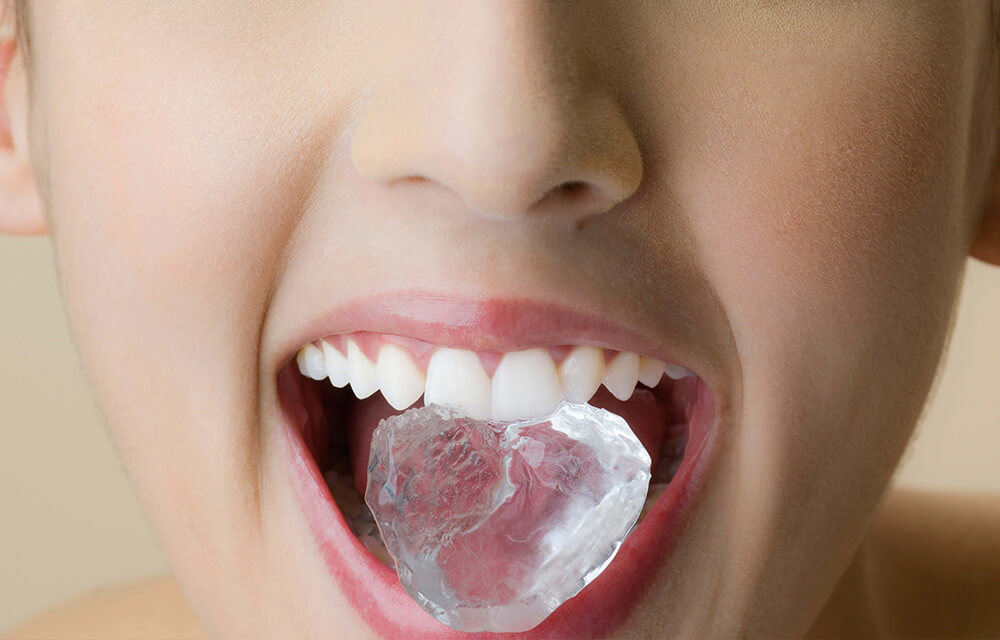Chances are you’ve happily crunched your way through an ice cube or two on occasion. Those melted chips of frozen delight that lurk at the bottom of a tall glass of your favorite beverage can be hard to resist. And for some of us, eating snow cones is a favorite summer tradition. Summer without a damp white paper cup of lemon ice is just a lost season of sweaty sadness.
However, chewing ice on a daily basis could wreak havoc on your teeth if you’re not careful.
Common questions about chewing ice
Read on to find out how you can break the habit and save your smile from the frigid embrace of your icy little overlords.
Is eating ice bad for you?
Yes, chewing ice can cause numerous oral health issues that could eventually lead to an expensive dental visit.
Chewing ice seems like a harmless activity, apart from annoying others with the constant crunching. But the truth is that gnawing on cubes can indicate serious health conditions and can ruin your teeth and hurt your gums.
Why do people chew ice?
“Pica” is the medical term for craving and chewing on items with little or no nutritional value — such as ice, dirt, clay, chalk, paper, paint, sand, and rocks. Chewing on ice is called pagophagia, and it’s the most common form of pica. Compulsive ice chewing is increasingly considered a symptom of anemia, particularly iron-deficiency anemia.
Medical scientists aren’t 100% sure why people with anemia seem compelled to chew ice. Still, they suspect the coolness of the crunchy cubes may soothe the oral inflammations often caused by iron deficiencies.
A study from Medical Hypotheses indicates that eating ice acts like a cup of strong coffee for those with insufficient iron. Anemics often report feeling fatigued and foggy-brained due to their bodies’ inability to produce enough oxygen-carrying hemoglobin.
Our bodies have a hardwired response to being submerged in cold water. Our heart rates slow, and the blood vessels in our legs and arms constrict. The idea is to keep the brain fed with oxygen and protect the body’s other core functions. Researchers think that the cold jolt provided by chewing ice might push better-oxygenated blood to the brain, which would help people with anemia feel awake and focused. Sipping on ice water does not produce the same perky feeling.
Other reasons to chew ice include relief for a dry mouth, quitting cigarettes, stress relief, boredom, or an attempt to cut back on food consumption to lose weight.
What are the dangers of chewing ice?
Regularly chewing ice can cause a lot of oral health problems, which may include:
- Cracked and chipped teeth — Teeth may seem durable, but they’re not designed for chewing tough, rigid objects like ice. This can cause chipped or cracked teeth, possibly requiring an emergency dental visit.
- Tooth enamel damage — Tooth enamel helps defend your teeth against cavities and sugar and acid attacks. Chewing ice can damage tooth enamel, leaving your teeth vulnerable to potential dental problems.
- Problems with existing dental work — Oral appliances such as fillings and crowns help keep your dental health intact. Chewing hard substances like ice can damage your fillings or crowns, which often requires an immediate dental visit.
- Sore jaw muscles — Chewing ice damages not only your teeth but also your jaw. This could lead to temporomandibular joint (TMJ) disorder with symptoms ranging from slight discomfort to severe pain.
Quitting the ice chewing habit
Consider getting a physical checkup to see if you have anemia or another issue causing you to crave ice.
If you’ve opted to chew on ice due to dry mouth problems or to kick a tobacco habit, try switching to cold drinks or popsicles. To avoid weight gain and cavities, you may want to look for unsweetened popsicles. You can even make your own by freezing a tiny bit of fruit juice for taste, and water.
If you must chew ice, you’re likely to cause the least damage by sticking with finely shaved or semi-melted slivers of ice rather than cubes or chunks.
How can I chew ice without damaging my teeth?
Honestly, you can’t – chewing ice just is not good for your teeth. Use the tips above to help you quit.
And remember, regular dental care is essential to reduce and repair the damage that can be caused by chewing ice – as well as maintain your dental health. If you’ve been putting off seeing a dentist due to cost, you’ll be happy to know that there is an affordable alternative to paying out of pocket or paying for insurance: a dental savings plan. Plan members report saving an average of 50%* on dental procedures – from emergency care to check-ups, root canals and crowns, fixes for chipped teeth and cavities, and even braces.
To learn more about dental savings plans, call our expert team at 1-833-735-0399 – we’ll answer any questions you have and recommend the best plan for you, in minutes. Want to take a quick look at what a dental savings plan can save you right now? Use our calculator below.
*Discount Health Program consumer and provider surveys indicate average savings of 50%. Savings may vary by provider, location, and plan.

 Login
Login

